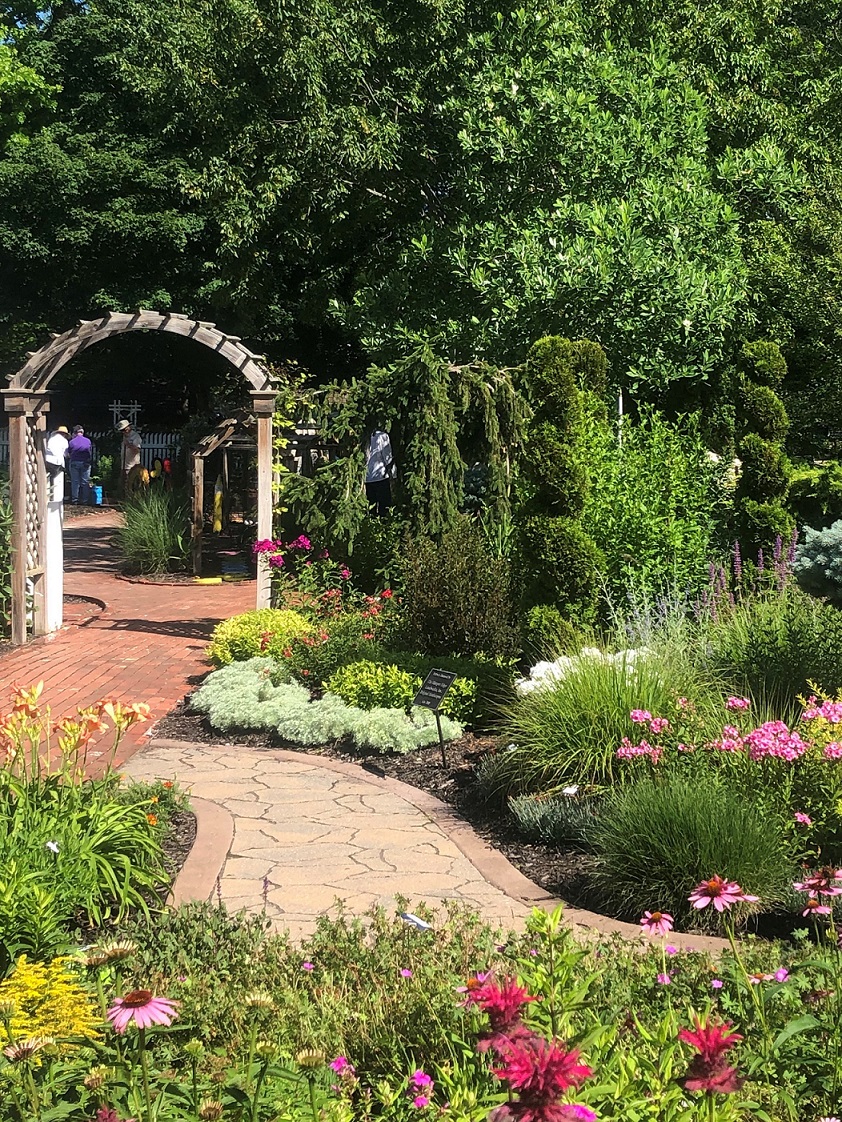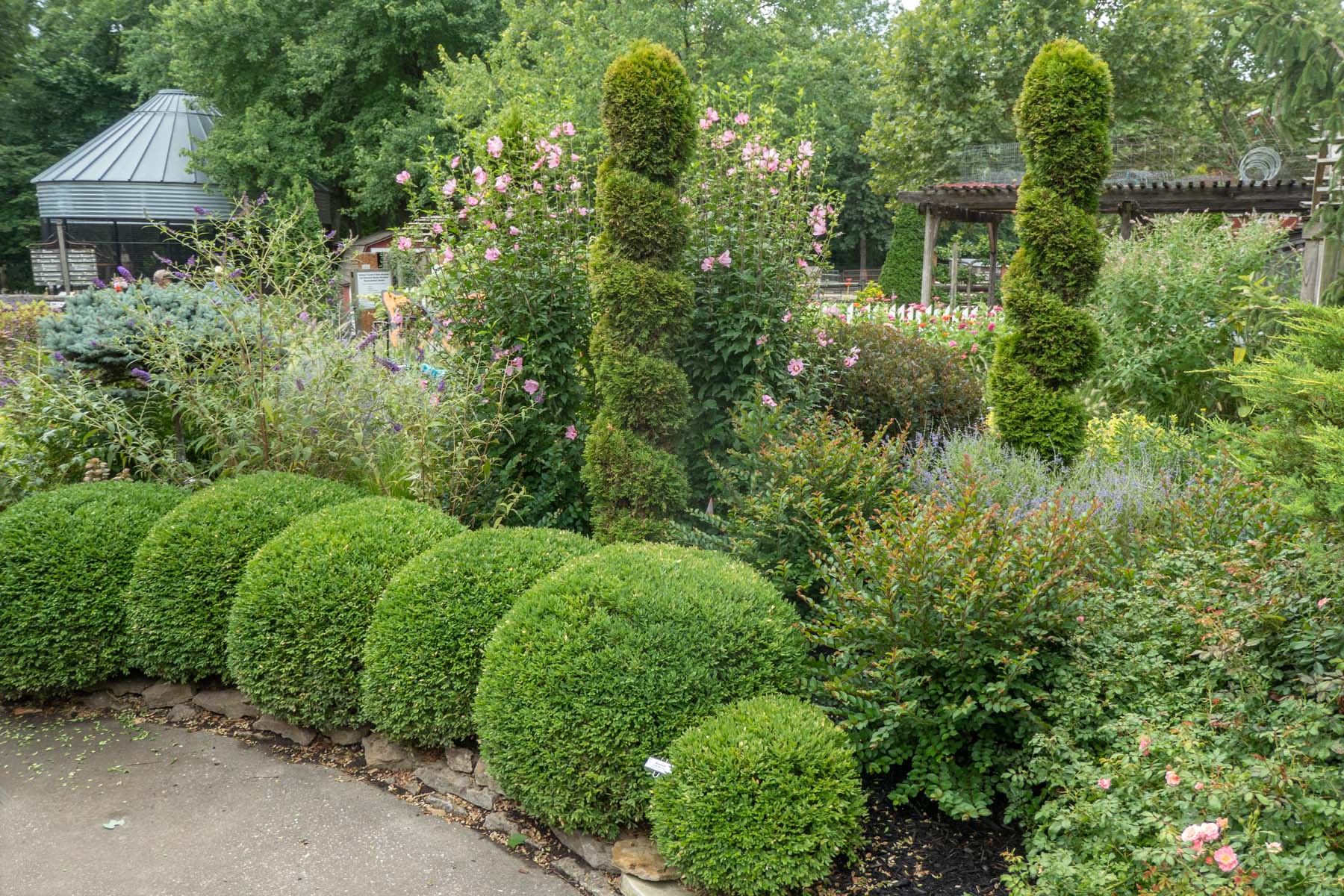Deanna Rose Farmstead

The focus of the Deanna Rose Children’s Farmstead (DRCF) is to provide children with the experience of an actual interactive farmstead that includes many different types of animals, and the buildings and environment that might have been experienced on a farm in past years. It is operated by the city of Overland Park. The demonstration gardens at the farmstead were first established in 1982 and have now been maintained by the Johnson County K-State Research and Extension master gardeners (EMGs) for over 40 years. The EMGs work in partnership with the city who provides the land, watering systems and some garden materials. The demonstration gardens were originally started as a vegetable garden but have since been expanded to include a wide variety of plants and environments covering about an acre of land.
Many school groups pass through the gardens in organized tour groups walking through the farmstead. The farmstead is open to the public for a minimal daily cost or with a season membership. An average of 450,000 people visit the farmstead each year. The goal of the gardens is to provide information for both adults and children about many types of plants and gardens and where and how to plant them. The information is university research based in accordance with the mission of the K-State extension. The gardens are intended to be demonstrations of what persons can do in their own home gardens. The many diverse areas in the garden enable them to learn new ideas they can implement themselves. A secondary but very important focus is providing an environment for pollinators including bees and butterflies. The garden is a Monarch Watch Way Station and a certified Wildlife Habitat.
Twelve Individual Gardens
The garden area maintained by EMGs include the following individual gardens:

- Beverly’s Garden – originally planted as a butterfly garden, but partially converted to a woodland garden due to tree growth and the resultant increase in shade in the area.
- Butterfly Garden – planted with host and nectar plants to support butterflies.
- Children’s and Herb Garden - one of the favorite areas for children that includes colorful pavers highlighting the alphabet, numbers and various animals and several children friendly structures and an Herb Garden.
- Container Gardens - containers that are planted every year with colorful annual flowers to supplement several perennials.

- East Border Garden – primarily trees and shrubs including several topiaries.
- Mixed Border Garden – mix of perennial and annual plants.
- Perennial Garden – a wide assortment of perennial plants in both shade and sunny areas. This garden also features several espalier pear trees.
- Pollinator Garden – one of our newer gardens established during 2021-2022 as described below.
- Prairie Meadow Garden – our newest garden area under development as described further below.
- Novelty Garden - contains unusual plants that are not normally found in gardens in the area and demonstrates that these types of plants can be grown in this climate zone.
- Shade Garden – contains plants and shrubs that thrive in a heavily shaded location.
- Vegetable Garden – one of the larger garden areas that is planted with different vegetables in spring, summer and fall.
Produce from the Vegetable Garden is donated to a local food pantry. An average of 1000 pounds of vegetables are grown each year in the vegetable garden. The Vegetable Garden also partners with a local community garden organization who is a low-cost provider of vegetable garden seeds and plants. The vegetable garden area is used to provide a demonstration of the kinds of produce that can be grown on smaller plots of land and in a raised bed garden.
Recent Changes
A large wood frame raised bed was installed in the vegetable garden in 2020. It demonstrates how such a garden can be installed in a homeowner’s yard and be more easily maintained than a ground level garden.
In 2021 and 2022 all of the existing plants were removed from one existing garden area. The area was then replanted with pollinator plants to create an environment for all types of pollinators. Bee houses and water pans were also installed in the Pollinator Garden to support the bee and butterfly population.
A large area in Beverly’s Garden was replanted in 2022. One of the features of this garden is a large dead tree trunk that was laid on the ground. The trunk has planters that were created by sawing a section of the side of the trunk and planted with annual flowers.
In 2022 development began on our twelfth garden area, which is the Prairie Meadow Garden. This garden utilizes an existing raised bed in the farmstead that the city had maintained previously, but recently was just a grassy, weed infested area. The ground was prepared by spraying the plants with an herbicide and also placing plastic sheets over the ground to smother out the plants. This area was planted with seeds in January 2023.

DRCF Public Outreach
In 2022, a DRCF public outreach committee was formed of EMGs who work in the gardens. The goal of this committee is to plan and organize specific gardening learning experiences for the public coming to the farmstead. Seeds and information on the EMG gardening hotline are provided to all visitors on opening day of the farmstead and EMGs are available to answer gardening questions. A “butterfly camp” is held to teach school children in a tour group more about butterflies and their importance. Information on butterflies, gardening and butterfly coloring sheets and an area to color them are made available during the farmsteads annual “Bug Ball” event. Later in the summer several scheduled demonstrations are given to visitors informing them about Monarch butterflies and how to catch, tag and release them so their migration can be tracked.
Signage is provided throughout the gardens. These include individual plant identification tags, garden name signs and specific signs to provide more information on plants and how they should be planted and maintained.
Garden Address
137th and SwitzerOverland Park, KS
Park Hours:
9 a.m. – 5 p.m., April 1 – October 31
The K-State Extension Master Gardeners are on site planting and maintaining the gardens and are available to answer questions while they work the gardens Tuesday mornings, April – October.
Return to Demonstration Gardens.
Do You Have Questions?
Have questions? The Garden Hotline is staffed by trained EMG volunteers and Extension staff who will assist you with questions.
Phone: (913) 715-7050
Email: garden.help@jocogov.org




